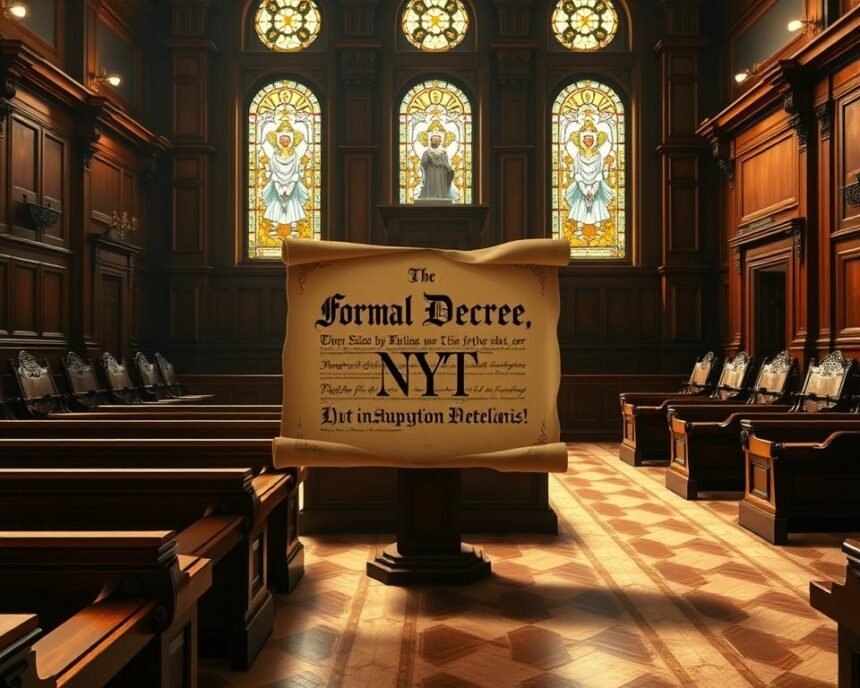Williams vs. North Carolina is a key case in American law. It deals with state laws on recognizing divorces across states. Decided in 1942, it focused on the Full Faith and Credit Clause of the U.S. Constitution. The case also impacted how people deal with divorce laws in different states.
Understanding the Legal Precedents of Williams v. North Carolina
Williams v. North Carolina involved Mr. Williams and Ms. Hendrix. They got divorced in Nevada while temporarily living there. Back in North Carolina, they faced charges for bigamy. This was because North Carolina didn’t recognize their Nevada divorces. The key legal question was whether North Carolina had to acknowledge Nevada’s divorce decrees. This was based on the complexities of domicile and residency.
The Implications of Williams v. North Carolina on State Law
The ruling in this case greatly affected state law, especially in recognizing each other’s legal decisions. The Supreme Court decided that states must honor divorce decrees from other states, as long as those decrees were valid there. This ruling ensured that people wouldn’t be punished in their home state for legal actions taken in another state, if those actions were legal there.
Key Arguments in Williams vs. North Carolina: A Legal Analysis
The main debate was whether North Carolina could contest Nevada’s ruling on residency, crucial for the divorces. The defendants claimed their Nevada residency was valid. They argued, therefore, their divorces deserved recognition under the Full Faith and Credit Clause. On the other hand, North Carolina argued that since neither party was in Nevada during the divorce, the decrees shouldn’t be honored.
Historical Context of Williams v. North Carolina: What Led to the Case?
This case is set in post-World War II America, where divorce rates climbed. People sought easier divorce laws, especially in Nevada. Mr. Williams and Ms. Hendrix faced challenges due to different state marriage and divorce laws. They chose to divorce in Nevada because its laws are more lenient.
The Supreme Court’s Decision in Williams v. North Carolina Explained
The Supreme Court ruled that North Carolina must recognize Nevada divorces. It can’t ignore them just because of its own residency rules. The Court stated that as long as the Nevada court had jurisdiction and followed due process, other states must respect its decisions.
Impact of Williams v. North Carolina on Divorce Laws Across States

The ruling set a precedent affecting how states manage divorces. It involved residents seeking help in other states. The case highlighted the need for consistent recognition of marriages and divorces across states. This, in turn, promotes legal uniformity nationwide.
Williams vs. North Carolina: A Case Study in Full Faith and Credit Clause
The Full Faith and Credit Clause requires states to respect each other’s public acts, records, and judicial proceedings. The ruling in Williams vs. North Carolina was key. It interpreted a clause and applied it to family law, including marriage and divorce. This case is a key reference for talks on interstate recognition of legal judgments.
The Role of Domicile in Williams v. North Carolina: A Deep Dive
Domicile played a crucial role in this case as it determined whether Nevada had jurisdiction to grant a divorce to Mr. Williams and Ms. Hendrix. The Supreme Court found that if both parties were bona fide residents of Nevada at the time of their divorces, then their divorces were valid. This was true regardless of their later return to North Carolina. This aspect highlights how jurisdictional issues can complicate family law.
Comparative Analysis: Williams v. North Carolina and Other Landmark Cases
When compared with other landmark cases involving interstate recognition of laws—such as Loving v. Virginia or Obergefell v. Hodges—Williams vs. North Carolina shows a clash over individual rights. It is between state sovereignty and federal oversight. . Each case reflects evolving societal norms around marriage and family structures.
Williams vs. North Carolina: The Justices’ Opinions and Dissenting Views
The decision was not without dissent. Some justices were concerned about allowing one state’s laws to override another’s on marriage and divorce. These differing opinions reveal ongoing debates about states’ rights versus federal mandates.
Legal Ramifications of the Williams v. North Carolina Ruling
The ruling has affected how states handle divorce law, especially residency rules for getting a divorce. It led more people to seek divorces in places with better laws, without fear of legal repercussions upon returning home.
Public Reaction to the Williams v. North Carolina Supreme Court Decision
The public had mixed reactions to the ruling. Many celebrated it as a win for individual rights. Others saw it as an infringement on state authority over family law. This dichotomy reflects broader societal tensions regarding personal freedoms versus community standards.
Future Legal Challenges Following the Williams v. North Carolina Case
Due to this ruling, new legal challenges have arisen. They concern how states interpret domicile and residency for marriage-related issues. As society continues to evolve regarding family dynamics, these challenges will likely persist.
Williams vs. North Carolina: Lessons Learned for Modern Family Law

Williams vs. North Carolina offers lessons still relevant today. It helps address how states recognize marriages and divorces. Understanding this case can guide future laws. The aim is to make family law consistent across states.
Conclusion: Williams vs. North Carolina
In conclusion, Williams vs. North Carolina is a landmark case. It changed how states interact on marriage and divorce laws in the U.S. Its effects are felt today. Courts now face complex issues of jurisdiction, domicile, and rights in a mobile society.

